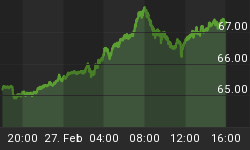Amid the recent stock market weakness, the pundits are virtually unanimous in their claims that good underlying economic fundamentals are being trumped by irrational fear. However, if investors understood just how bad the fundamentals for the U.S. economy really are, they would dump stocks even faster. So, contrary to the rhetoric, it is not that investors are being too fearful, but that they are being too complacent.
During the recent stock market rally investors ignored some very disturbing underlying economic fundamentals. Therefore, the current weakness in the market is not in conflict with the fundamentals, but completely consistent with them. Unfortunately for the overall economy, the re-assertion of fundamentals is not exclusive to the stock market. Here is a look at what will likely happen to other asset classes and our economy should investors refuse to blindly follow the Pied Pipers of Wall Street:
Gold and gold stocks.
Rather than trading in tandem with other assets (as they recently have), gold and gold stocks will diverge, registering their largest gains on days when general stock prices fall. Currently, liquidity is driving all markets simultaneously. However, when those seeking liquidity realize that gold is its ultimate form, they will embrace it and shun paper alternatives. When that happens, gold stocks should shine even brighter than the metal itself.
The dollar
Once foreign and domestic holders of greenbacks understand the severity of the risks facing the U.S. economy, they will dump dollars hand-over-fist. As the value of the dollar falls, interest rates and consumer prices will rise. This will compound the problems in the housing and mortgage markets, as well as for the overall U.S. economy, engendering even more dollar selling.
Bonds
For now, U.S. Treasury bonds have benefited from the so-called "flight to quality". Once investors realize that Treasuries can not protect them against the falling dollar, safe haven money will flee Treasuries as well. As interest rates rise, the problems for our economy will only intensify. If the Fed reduces short-term rates to cushion the blow, Treasuries will come under even greater selling pressure. So in effect, any attempt by the Fed to reduce interest rates to bolster housing will backfire, as rising long-term yields will only put additional nails in the housing coffin.
Real Estate
When reality sets in, housing prices will collapse. Today's announcement that Wells Fargo is raising rates on prime jumbo mortgages (a significant percentage of California homes fall into that category) to 8% from 6 7/8%, will help accelerate this process. As potential home buyers will once again be required to fully document their incomes, provide 20% down payments, and pay 8% annually on fully amortized mortgages, home affordability will be out of the question unless prices fall sharply.
The U.S. economy
When real estate prices collapse, trillions of dollars of home equity will be wiped out, with disastrous repercussions for an American economy addicted to consumer spending. Though many consumers will see their home equity vanish, their mortgage debt, much of which will become more burdensome once adjustable rates reset much higher, will remain. Flat broke and facing rising mortgage payments, as well as higher gas and food prices, consumers will severely pull back on discretionary spending. As millions lose their jobs as a result of this retrenchment, the recession will kick into high gear, causing even greater damage to the real estate market, the dollar, bonds, and the economy, resulting in even more safe haven flows moving into gold.
For a more in depth analysis of the tenuous position of the Americana economy and U.S. dollar denominated investments, read my new book "Crash Proof: How to Profit from the Coming Economic Collapse." Click here to order a copy today.
More importantly, don't wait for reality to set in. Protect your wealth and preserve your purchasing power before it's too late. Discover the best way to buy gold at www.goldyoucanfold.com, download my free research report on the powerful case for investing in foreign equities available at www.researchreportone.com, and subscribe to my free, on-line investment newsletter at http://www.europac.net/newsletter/newsletter.asp.















